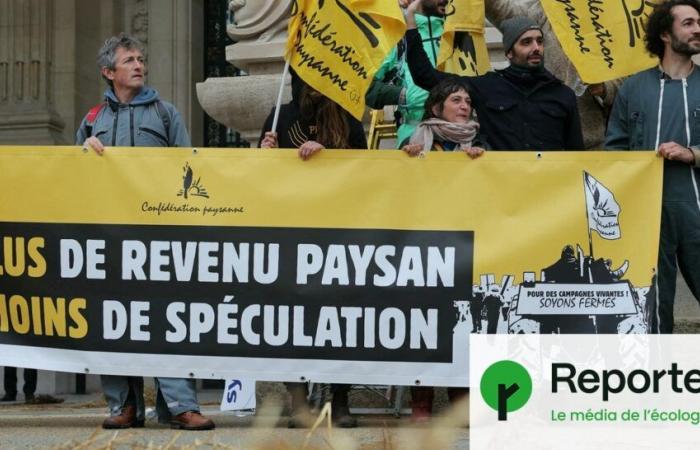For more than a year, they have expressed their anger on the roads. If farmers have mobilized to demand better incomes and the end of the free trade agreement with the Mercosur countries (Argentina, Brazil, Paraguay, Uruguay, Bolivia), there are many differences within the profession. One of these visions of agriculture could well prevail and obtain control of the chambers of agriculture, whose elections are being held until January 31. Enough to guide the country's agricultural policy and influence debates with the government.
Read also: Chambers of Agriculture: why farmers vote so little
2.2 million people from the agricultural world (farm managers, agricultural employees, retirees, etc.) are thus called upon to choose which unions will control the 102 departmental, interdepartmental, regional and national chambers of agriculture. Three main agricultural unions defend radically different visions of agriculture: the National Federation of Farmers' Unions (FNSEA), majority and productivist ; Rural Coordination (CR), with values compatible with those of the extreme right ; and the Peasant Confederation, classified on the left.
Transmission of farms, income, pesticides, free trade agreements… Reporterre takes stock of the positions of the three main unions.
The transfer of farms
This is one of the main challenges for the agricultural world in the years to come. In 2020, 43 % of farmers were over 55 years old. Among them, more than a third had no idea about the future of their farm. Who to replace them ? The number of farmers continues to decline: there were 2.5 million in 1955, and 496,000 in 2020. At the same time, farms have grown to reach 69 hectares on average in 2020, compared to 55 hectares in 2010.
This is why the priority of the Peasant Confederation is to fight against land grabbing and the extension of existing farms in order to encourage the installation of new professionals. The union therefore calls for « democratic and transparent governance of Safer » (Land development and rural settlement companies) — these organizations having a right of oversight over the sale of agricultural land and farms — and a « real land law to preserve and distribute agricultural land ». He wants to give tax advantages to the sales of goods destined for the installation rather than the expansion of other farms.
For its part, the Rural Coordination is also worried « the phenomenon of expansion of farms which makes them difficult to transmit » and deplores the way in which the Safer operate, all controlled by the FNSEA. To facilitate the transfer of farms, it requests a tax reduction for transferors who sell their farm to a young farmer.
For the FNSEAthe solution also involves tax measures which encourage farmers to transfer their farms earlier. The productivist union also pleads for modernizing training courses, « particularly by developing managerial and entrepreneurial skills ». On the question of land grabbing by the largest farms, the FNSEA remains silent.
Farmers' income
Here again, the observation is the same: all the unions defend better remuneration for farmers. According to INSEE, in 2020, the median income of agricultural households was 1,900 euros net per month, an amount which also includes the salary of the spouse and the inflows of money linked to the rental of land. In detail, income inequalities within the profession are very strong: the poverty rate [1] reached for example 25 % for market gardeners and 11.5 % for wine growers.
During the debate organized on the channel LCP On January 13, Laurence Marandola, spokesperson for the Peasant Confederation, defended guaranteed minimum prices in order to cover production costs, labor, charges and social protection. This must be accompanied by a distribution of volumes, « otherwise the big ones [producteurs] will take everything ». In addition, she considers that the Egalim law, which since 2018 provides for a price range below which a buyer cannot sell, is insufficient, as the law does not apply « only on a voluntary basis ».
Without taking a clear position on floor prices, Véronique Le Floc'h, president of Rural Coordination, estimated during the debate that it was necessary to act on two levers: prices and charges. She calls for a law to moralize cooperatives to « that all dividends from private subsidiaries belonging to our cooperatives go to the farmers ». She also pleads for the reduction of charges, notably through an energy shield.
Opposed to floor prices, Arnaud Rousseau, spokesperson for the FNSEAcalled for more transparency and rigor in the application of the Egalim law. The union also calls for production costs to be taken into account in contracts to determine the prices of agricultural products.
Ecology
It is undoubtedly on this theme that positions diverge the most. On pesticides, the Peasant Confederation demands an immediate ban on the most dangerous products, classified as carcinogenic, mutagenic, reprotoxic (CMR) and endocrine disruptors (PE). To get away from pesticides, the union classified on the left wants to encourage research in order to develop alternatives, and calls for a change of model to put an end to the « fierce competition ».
On the organic side, the Peasant Confederation is asking for more financial support for the sector, and compliance with the Egalim objective, aiming for 20 % of products from organic farming in collective catering. Opposed to the simplification of environmental standards, she also fights against megabasins.
Anti-green, the Rural Coordination is particularly opposed to the European Green Deal, which recommends reducing pesticides by half by 2030. The union close to the far right is also in favor of abolishing the French Office of biodiversity (OFB) – whose premises some affiliated farmers regularly attack -, for the reduction in the price of non-road diesel, the simplification of environmental standards – reasons for their mobilizations on the roads -, and megabasins.
A position very close to that of the FNSEAwhich calls for a much more lax environmental policy. The union, which never mentions pesticides in its program, obtained last year the elimination of the Écophyto strategy, which aims to reduce by 50 % the use of pesticides by 2030, as well as the simplification of environmental standards such as those linked to the protection of hedges or fallow land.
On the effects of climate change, the FNSEA defends technological solutions and limits itself to asking « prompt compensation for the damage suffered ». He also calls for the suspension of controls of agents of theOFBthe deployment of megabasins and « legally secure existing works ».
Free trade agreements
If all three unions have expressed their opposition to the free trade treaty between the European Union and the Mercosur countries, not all share the same vision of free trade. The Peasant Confederation and the Rural Coordination are opposed to all free trade agreements, leading, according to them, to a drop in farmers' income, and are calling for a relocation of production. In order to protect farmers from unfair imports, the Peasant Confederation wants the establishment of minimum entry prices into the territory.
Well that the FNSEA has called for demonstrations against the agreement with Mercosur, the liberal union does not want the elimination of free trade treaties. He only demanded « more transparency on negotiations »and wishes to impose mirror clauses, with social and ecological standards identical to those of the European Union.
legend






